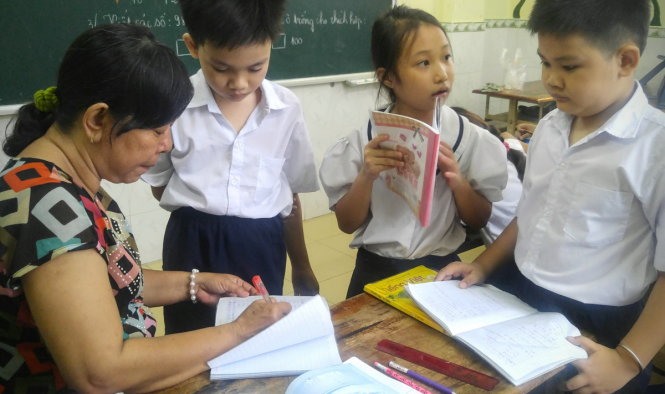 Society
Society

A class of love located at the busy and crowded HCM City has became a dear school of 60 poor children who didn’t have enough money to go to school for over the last 17 years.
 |
| A retired teacher at a special school in District 7 for children of poor migrants. — Photo touitre.vn |
HCM CITY — For the last 17 years, a special school in HCM City’s District 7 has been providing a priceless service to children of poor migrant workers struggling to eke out a living.
Every year, this school, set up under a small project called Cầu Hàn which enrolls about 60 poor children whose parents do not have enough money to send them to school.
For two hours a day, Monday to Friday, these children, mostly from the district’s Tân Thạnh Tây, Tân Quy and Tân Kiểng wards, are taught by retired teachers.
A small house with two “classrooms” and a living room serves as a makeshift school for students from first to fifth grade.
“Most of the students are not good at learning, so they have to go to class from the beginning of August instead of September to revise lessons,” Đỗ Ngọc Tuyết, 62, a retired teacher, told the Tuổi Trẻ (Youth) newspaper.
Besides lessons following the curricula set by the Ministry of Education and Training, the students also learn about traffic safety, children’s rights, violence, abuse, HIV prevention and human trafficking.
“Their parents are so busy with their work all day, because most of them are migrant workers and do not have time to take care their children, so we also have to teach them skills to protect themselves,” said project manager Huỳnh Kim Tiên.
Because their parents are always away, the children have to fend for themselves most of the time, and come to the class on their own, she said.
An old person from Vĩnh Long Province who earns a living by selling lottery tickets in HCM City said he takes his grandchild to the school everyday because her parents were busy working in a processing zone from 5am to 8pm.
He said his granddaughter and other kids like her, unable to enjoy a public school education because their parents were too poor, were very happy to attend the free classes.
Nguyễn Thị Phương, mother of a 9-year-old boy, said she had to teach her son at home because local schools refused to enroll him saying he was too old to join the 1st grade.
Then the local authorities introduced her to the Cầu Hàn project, and he was very happy to take part in it, she said.
However, despite all these efforts, by the end of the academic year, many students drop out of this special school. While some stop studying, others follow their parents to wherever they find work next.
Most students here do not dream of becoming teachers or doctors, they just want to open a small shop and earn a living, teachers said.
“Sometimes, we organise training courses for the parents, but it is hard to change their minds, even about hitting their children,” Tuyết said.
“However, the good behavior of children after joining the classes helps their parents change, at least partly.”
One of the teachers said the students were very playful and active, so they have to use positive disciplinary measures instead of hitting them.
Most of the teachers here are retirees. They miss their classes and students, so they are happy to use their free time to help children here, with very small support from the project.
“I want to dedicate my remaining life to be a teacher to these children, until my mind is off and the class does not need me,” said a teacher named Tiên.
Nguyễn Thị Kim Thoa, who oversees child welfare and gender equality in the Tân Quy Ward administration, said that every year, 8 to 9 students 14-18 years old are brought from public schools to this special school to teach children about preventing sexual abuse and human trafficking.
Then, they set up a team including children, to learn self-defence skills and raise awareness of social evils, Thoa said.
“The team will help poor and local children join community activities, adding to what they are taught at this (special) school,” she said. — VNS